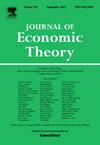Attention, coordination, and bounded recall
IF 1.2
3区 经济学
Q3 ECONOMICS
引用次数: 0
Abstract
I consider a class of strategic interactions under asymmetric information in which, prior to finalizing their actions (consumption, production, or investment decisions), agents choose the attention to allocate to a large number of information sources about exogenous events that are responsible for their payoffs (the underlying fundamentals). I study what type of payoff interdependencies contribute to inefficiency in the allocation of attention. I then compare the results for the benchmark of perfect recall (in which the agents remember the content of individual sources) to those for bounded recall (in which the agents are unable to keep track of the influence of individual sources on posterior beliefs). More generally, the analysis illustrates the implications (for attention and usage of information) of a certain form of bounded rationality whereby the summary statistic the agents recall from the sources they pay attention to is distorted away from the optimal action towards the Bayesian projection of the exogenous fundamentals over the signals received.
注意,协调和有限回忆
我考虑了不对称信息下的一类战略互动,在完成他们的行动(消费、生产或投资决策)之前,代理人选择将注意力分配给大量有关外生事件的信息源,这些信息源负责他们的收益(潜在的基本面)。我研究了哪种类型的报酬相互依赖导致了注意力分配的低效率。然后,我比较了完美回忆基准的结果(在这种情况下,代理记住了单个来源的内容)和有限回忆基准的结果(在这种情况下,代理无法跟踪单个来源对后验信念的影响)。更一般地说,该分析说明了某种形式的有限理性的含义(对于注意力和信息的使用),即代理从他们关注的来源中回忆的汇总统计数据被扭曲,从最优行为转向接收到的信号上外生基本面的贝叶斯预测。
本文章由计算机程序翻译,如有差异,请以英文原文为准。
求助全文
约1分钟内获得全文
求助全文
来源期刊

Journal of Economic Theory
ECONOMICS-
CiteScore
2.50
自引率
12.50%
发文量
135
期刊介绍:
The Journal of Economic Theory publishes original research on economic theory and emphasizes the theoretical analysis of economic models, including the study of related mathematical techniques. JET is the leading journal in economic theory. It is also one of nine core journals in all of economics. Among these journals, the Journal of Economic Theory ranks fourth in impact-adjusted citations.
 求助内容:
求助内容: 应助结果提醒方式:
应助结果提醒方式:


